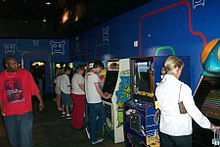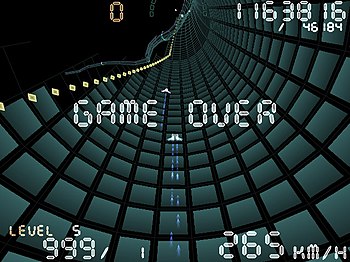Video game
Video games are electronic games played on a video screen (normally a television, computer monitor, or built-in screen when played on a handheld machine).
There are many types, or genres, of these games: role-playing games; shooters, first-person shooters, side-scrollers, and platformers.
Video games usually come on CDs, DVDs or digital download. Many games used to come on cartridges. A specialized device used to play a video game at home is called a console. There have been many types of consoles and home computers used to play video games. Some of the first were the Atari 2600 in the 1970s and the Sega Master System and Nintendo Entertainment System in the 1980s. Newer video game consoles are Microsoft's Xbox Series X, Sony's PlayStation 5 and Nintendo's Nintendo Switch. The best-selling video game console of all time is the PlayStation 2, made by Sony.
People can also use computers to play games, which are sometimes called PC games. The older consoles do not have new games developed for them often, although some console games are emulated for PCs (see emulator). This means that new computers can play many old console games along with games made just for new computers. Older games are often more popular emulated than when they were first on sale, because of the ease of download[source?].
People can play portable video games anywhere. Mobile devices (running operating systems such as iOS or Android) also can download games, making them portable game machines. Mobile phones have many games, some of them using a mobile emulator for games from consoles. Not all PC or console games are on mobile or iPad/ iPod/Tablet.
Competitions of video game players are called electronic sports. Also known today as e-sports.

Current generation consoles
[change | change source]- The current Xbox models are the Xbox Series X and Series S, which came out in November 2020. The console before it, the Xbox One came out in November 2013 followed by the Xbox One S in November 2016, and then by the Xbox One X, originally named, in November 2017.The Xbox series is made by the American company Microsoft. It replaced the Xbox 360 and offers a similar online experience and controller, but with improved graphics. Like the original and 360 versions, it also allows people to put music from an MP3 player or other sources onto the system. It was the last of the 8th generation consoles to come out.
- The PlayStation 5, which came out in November 2020, is currently the newest console from the PlayStation series of game consoles from Sony Computer Entertainment, a division of the Japanese company Sony. It has two versions, one that can play discs and one that cannot. It can play many of the games from the console that came before it, the PlayStation 4.
- Nintendo, another Japanese company, has made many video game consoles over the years. The most recent is the Nintendo Switch, which came out in March 2017. The standard version of the console can be used as both a handheld console or can be connected to a television and used like a standard console. It is a console from the eighth generation of video games. It is a lot more successful than Nintendo's earlier console, the Wii U, which it has no backward compatibility with.

Current handheld consoles
[change | change source]The only handheld console that is supported today is the Switch, which looks like a tablet computer but can also be plugged into a TV. It is the first example of a "hybrid console" that can be used as both as a TV-based model and a handheld device. It was released in March 2017.
Sony's PlayStation Portable (PSP) came out in 2004. A new version, the PlayStation Vita, first came out in 2012.
Also in 2004, Nintendo released the Nintendo DS (Dual Screen), which has two separate screens, one of which is a touchscreen. New versions came out in later years, such as the Nintendo DSi in 2008 and the Nintendo DSi XL. The Nintendo 3DS, the first handheld console with 3D graphics, came out in 2011. The 2DS followed in 2013. The New 3DS XL, which is similar to the 3DS but with updated graphical capabilities, was released in 2015. The latest entry into the DS lineup is the "New 2DS XL", released on the 28th of July 2017.
History
[change | change source]The first video game ever is often said to be Tennis for Two,[1] a rudimentary tennis game to be played with two people developed in 1958. Another early example is Spacewar!, developed in 1962.
In the 1950s, when the first computers began to be made, three people had some ideas to create the basis of actual video games. In 1951, Ralph Baer, an American engineer of Loral Electronics, tried to create "the best television", proposing to add a gaming module, but his employer did not like his idea. Even if his idea was never realized, he is the first man to have thought of the idea of video games, later creating the first video game console, the Odyssey. Later, in 1952, A.S Douglas, of the Cambridge University in the UK, made a video game on a computer in order to illustrate one of his speeches. The game, called OXO, was a tic-tac-toe game, with two players (the person itself and the opponent, the computer) .In 1953, Willy Higinbotham made a game called Tennis For Two, similar to the later Pong, to entertain visitors to Brookhaven National Laboratory. Another early video game is a version of checkers, but this is largely overlooked.
One of the most famous and one of the earliest video games ever is called Space Invaders. Space Invaders was made in 1978 as a coin operated arcade game but a version has been made for almost every game console and home computer ever available.
Game Over
[change | change source]
A message signaling that the game has ended, usually because the player failed (for example by losing all of their lives) but sometimes following successful completion of the game.
Related pages
[change | change source]References
[change | change source]- ↑ "October 1958: Physicist Invents First Video Game". Retrieved 2018-06-29.
